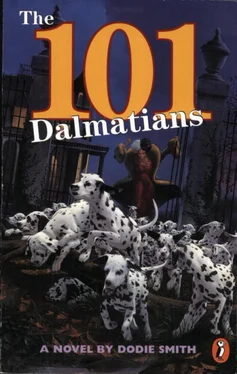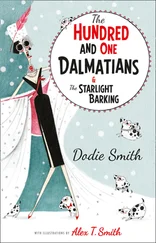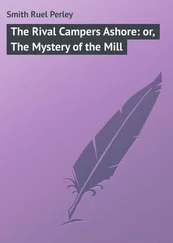Poor Missis! When she awoke in the late afternoon and looked around her, she dissolved into sooty tears.
“I can’t tell one pup from the other now they’re black,” she moaned. But she soon found she could, though she could never have explained how she managed it.
Another meal had been organized, but it was not all that could have been wished, because the butcher had meanly locked up his shop.
“This clears the bakery out,” said the Collie, carrying in the last stale loaf. “But there will be a good supper waiting for you. And the journey oughtn’t take more than three or four hours.” He then went off to see if there was any news coming in by the Twilight Barking.
After half an hour or so, Pongo began to feel anxious. It was quite dark now; they ought to be off. What was delaying the Collie?
“Listen!” said Missis suddenly.
Very, very faintly, they could hear the Collie barking. He was calling Pongo’s name, again and again.
Pongo and Missis ran out of the bakehouse to the little yard at the back. Now they could hear the Collie more clearly. But he was obviously some way off. Pongo barked in answer to him. Then swiftly the Collie told them what had happened.
He was locked in a house across the green, with no hope of getting out. The postmistress had promised to look after him while the baker was away for Christmas. She had decided it was too cold a night for a dog to be out, hauled him in, and gone out for the evening. He had tried every door and every window but could undo none of them. It was impossible for him to escort the Dalmatians, as he had promised.
“But you can’t miss your way, Pongo,” he barked. “Out over the field at the back of the bakehouse and straight on for five miles.”
Pongo told him not to worry. But the poor Collie was most unhappy. “Here I am, locked in with a warm fire and a good supper—and powerless to help you.”
Both Pongo and Missis told him to eat the supper and enjoy the fire, and thanked him for all he had done.
“And now, off we go,” said Pongo, bringing the pups out of the bakehouse. “And no straggling! Because it would be very easy to lose a black pup on a dark night.”
But it was not really a very dark night, for already the moon was rising and the stars were out. There was one specially large, bright star.
“The Collie said straight ahead, and that star is straight ahead,” said Pongo. “So we’ll steer by it.” He was thankful they were going by way of the fields and not by the road—for he remembered that Cruella had told the Baddun brothers she would come down “tomorrow night” to count the bodies. Now it was “tomorrow night” and the great zebra-striped car would be somewhere on the road from London to Suffolk. How terrible it would be to meet it! He imagined the glare from the headlights, imagined Cruella driving straight at the army of panic-stricken puppies. Yes, he would certainly avoid the roads! But, even so, it was frightening to know that Cruella might be quite near. He put the thought from his mind as he and Missis got the pups into marching order.
Their way lay through grassy meadows over which the Cadpig’s cart trundled smoothly. At every hedge and ditch Pongo paused and counted the pups to see none had strayed, and Missis changed the pups who drew the cart and the pups who rested in it. Already even the smallest puppies were getting hardier—even the Cadpig got out of the cart and walked three fields before getting in again.
“Soon we shall be able to do ten miles a day,” said Pongo. They had travelled about three miles when the first disaster of the night happened. There was a sudden bump, and a wild squeal from the Cadpig. A wheel had come off the little blue cart.
Pongo saw at once that the cart could be mended. A wooden peg which fixed the hub of the wheel to the axle had come out. But could he ever, using his teeth, put this peg back? He tried—and failed.
“Could the Cadpig manage without the cart?” he whispered to Missis.
Missis shook her head. Walking three fields had been enough for her smallest daughter. And her other daughters could not walk more than a mile without a rest.
“Then mend the cart I must,” said Pongo. “And you must help me, by holding the wheel in position.”
They tried and tried, without success. Then, while they were resting for a moment, Missis noticed that many of the pups were shivering.
“They’d better keep warm by running races,” said Pongo.
“But that would tire them,” said Missis. “Couldn’t they all go to that barn over there?”
They could just see a big tiled roof, two short fields away—not very clearly, because the moon was behind clouds; it was this lack of light which made it so hard to mend the cart.
“That’s a good idea,” said Pongo. “And when the cart’s mended, we can bring it along and call for them all.”
Missis said the Cadpig had better stay in the cart and keep warm in the hay, but the Cadpig wanted to go with the others and see the barn—she felt sure she could walk two short fields. So Missis let her go. Two strong pups the right size to draw the cart stayed behind. They said they did not mind the cold.
So ninety-five pups, led by Lieutenant Lucky, set off briskly for the barn. But when they got there it did not look at all like the barn at the Sheepdog’s farm. It was built of grey stone and had long windows, some with coloured glass in them, and at one end was a tower.
“Why, there’s a Folly!” said the Cadpig, remembering the tower of the Folly at Hell Hall.
Lucky was looking for a door, but when he found one it was firmly shut. He told the pups to wait for him while he want round the building looking for some other way in.
The Cadpig did not wait. “Come on,” she said to her devoted brother Patch. “I want to look at that Folly.”
And when they got to the tower they saw a narrow door that was not quite closed. It was too heavy for them to push, but they could—just—just—squeeze through.
Inside, this tower was nothing like the one at Hell Hall. And it opened into the grey stone building.
“No hay in this barn,” said the Cadpig. She had counted on the hay for warmth, but she soon found she was warm enough without it, for there was a big stove alight. It had a long iron pipe for a chimney, which went right up through the raftered ceiling. The moon was out again now, and its light was streaming in through the tall windows, so that the clear glass made silver patterns on the stone floor and the coloured glass made blue, gold, and rose patterns. The Cadpig patted one of the coloured patterns with a delicate paw.
“I love this barn,” she said.
Patch said, “I don’t think it is a barn.” But he liked it as much as the Cadpig did.
They wandered around—and suddenly they made a discovery. Whatever this mysterious place was, it was certainly intended for puppies. For in front of every seat—and there were many seats—was a puppy-sized dog-bed, padded and most comfortable.
“Why, it’s just meant for us all to sleep in!” said the Cadpig.
“I’ll tell the other pups,” said Patch, starting for the door. A glad cry from the Cadpig called him back.
“Look, Look! Television!”
But it was not like the television at Hell Hall. It was much larger. And the figures on the screen did not move or speak. Indeed, it was not a screen. The figures were really there, on a low platform, humans and animals, most lifelike, though smaller than in real life. They were in a stable, above which was one bright star.
“Look at the little humans, kneeling,” said Patch.
“And there’s a kind of a cow,” said the Cadpig, remembering the cows at the farm, who had given all the pups milk.
Читать дальше










